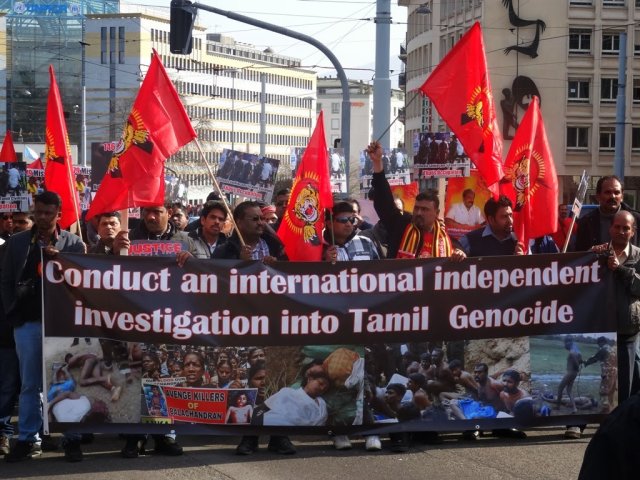
Addressing the United Nations Human Rights Council meeting in Geneva on March 14, Ananthi Sasitharan said: “We request this assembly calls for an international investigation on genocide, and as an immediate step, to come out with a mechanism to stop the ongoing genocide of Eelam Tamils.”
The Tamil ethnic minority in Sri Lanka is largely based on the island's north and east. With Tamils facing discrimination and violent pogroms, the Liberation Tigers of Tamil Eelam waged a decades-long armed struggle for an independent state.
It was defeated in 2009 by the Sri Lankan Army, which was accused of widespread war crimes.
Sasitharan was elected to Sri Lanka’s Northern Provincial Council as a representative of the Tamil National Alliance. She said she was “disappointed” with the draft resolution on Sri Lanka put forward by the US.
She said that the resolution does not address the main problems facing Tamils. “The root problem is the 60-year-old genocide against our people,” she said. “This genocide is still going on without a war. We call it structural genocide.”
On March 10, there was a demonstration in Geneva by 10,000 Tamils demanding an international investigation of genocide and a United Nations-conducted plebiscite enabling Tamils to vote on independence for their homeland, Tamil Eelam.
The US-sponsored resolution calls on the Sri Lankan government to “conduct an independent and credible investigation into allegations of violations of international human rights law and international humanitarian law”.
Since the Sri Lankan state is the main perpetrator of human rights violations in Sri Lanka, this is a call for the government to investigate itself.
The draft resolution mentions a recommendation made by Navi Pillay, the UN’s High Commissioner for Human Rights, that there should be an international investigation “in the absence of a credible national process with tangible results”.
However, the resolution contains no commitment to establish such an investigation.
The draft resolution expresses “serious concern at the continuing reports of violations of human rights in Sri Lanka, including sexual and gender-based violence, enforced disappearances, extrajudicial killings, torture and violations of the rights to freedom of expression, association and peaceful assembly”.
It expresses alarm at “the rapid rise in violence and discrimination on the basis of religion or belief, particularly against members of religious minority groups in Sri Lanka, including Hindus, Muslims and Christians”.
However, the resolution makes no mention of the oppression of the Tamil people. This is bizarre, given that discrimination and repression against the Tamils led to a three decades-long war for an independent Tamil homeland.
Since 2009, Tamil areas have been under military occupation. This is the source of most of the human rights violations that the resolution condemns.
The draft resolution talks of Sri Lanka as a “unified land”, implying opposition to the right of the Tamils to national self-determination.
However, it does call on the Sri Lankan government to “fulfil its public commitments, including on the devolution of authority”.
This is a reference to the central government's bid to starve the elected Northern Provincial Council of resources and disregard its decisions. The resolution urges the government to “provide the Northern Provincial Council and its Chief Minister with the resources and authority necessary to govern”.
The US government, while rejecting the right of the Tamils to self-determination, appears to believe the Sri Lankan government should make some concessions to the Tamils, such as allowing the Northern Provincial Council, the representative body for the predominantly Tamil north of the island, to function properly.
The US may have an ulterior motive. Tamara Kunanayakam, the former Sri Lankan permanent representative at the United Nations, said the US would like to establish a military base in Sri Lanka. She said the US is using the issue of human rights as a pretext to pressure the Sri Lankan government to agree.
Kunanayakam has said Sri Lanka needs an “internal democratic transformation” to deprive the US of an excuse for pressuring Sri Lanka, and perhaps eventually imposing sanctions.
This would have to include giving equal rights to ethnic and religious minorities. She says: “We need to find a solution that accords equal status to the minorities and ensure democratic transformation. We must eliminate privileges for a single group to create such equality.”
However the government of President Mahinda Rajapaksa, which promotes chauvinism among the Sinhalese ethnic majority as a tool to win mass support, seems unlikely to agree to any such “democratic transformation”.

Comments
thinesh replied on Permalink